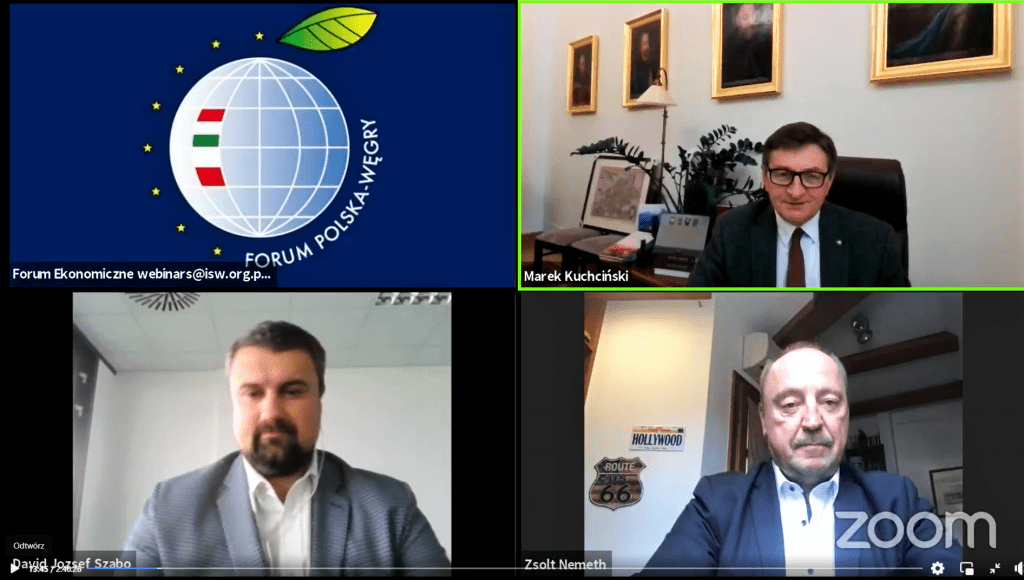The Head of the Foreign Affairs Committee Marek Kuchciński took part in the 3rd edition of the Poland-Hungary Forum. The main topic was the strengthening of relations between the two countries at the local, regional and national level. The participants discussed joint activities in the field of economy, foreign policy, activity in the EU structures, culture, regional cooperation and social policy. They also shared forecasts for
future and best practices to address the economic crisis caused by the coronavirus pandemic.
This year's edition was dedicated to the anniversary of the 1956 revolution. Those events were filled with pain, disappointment, and discord with the surrounding world, but they were also full of beautiful examples of Polish-Hungarian solidarity - mutual support manifested in demonstrations, banners, collecting medicine, and donating blood.
The first panel of the Forum was devoted precisely to Polish-Hungarian solidarity. Marek Kuchciński emphasizedthat the secret of good Polish-Hungarian relations lies in history. We share a common fate. Yesterday and today inter alia parliamentary contacts between Poland and Hungary have influenced not only the fate of the region but also of Europe. We can point to three key elements that connect us:
- We are historical nationsIn the 10th century we adopted Christianity, on which we built our statehood and nationality. This can be seen in the Hungarian anthem and in one of the most important Polish songs "Bo¿e coś Polskê..."
- AlliancesWe fought side by side more than once, for example at the battles of Mohacz and Varna.
Marshal Kuchciński also reminded that the cooperation between Poland and Hungary has a positive impact on the Visegrad Group. - We need even more contacts and closer mutual relations. I see no weaknesses in our cooperation - he argued.
Chairman of the Foreign Affairs Committee of Hungary Zsolt Németh said that in In recent days, there have been sharp discussions in Brussels (both in the European Parliament and in the Council of Europe) on the issue of the rule of law. Prime Minister Morawiecki was questioned in an aggressive style, and the current situation shows once again that we can count on each other. What happened in Poznan in 1956 triggered later events in Budapest. Németh He added that today we see how the Brussels mainstream uses double standards in relation to individual EU countries. In the past, changes in German constitutional law did not evoke such reactions as they do in Poland today.
The Hungarian politician stressed that he is not against Europe. He believes that the EU should act as a service provider and allow us to preserve our sovereignty and constitutional identity. National constitutions and constitutional identity are absolutely fundamental.
The expansion of the North-South corridor is also of capital importance. It is important to create diversified energy sources. Climate protection must not be carried out at the expense of the welfare of citizens. Hungary supports the Polish policy on this issue. They support nuclear energy, which they consider to be green energy.
Németh He assured that Hungary will maximally support the Polish raison d'état at the Eastern Partnership summit in December. - Attacking minorities has made us fearful. Political leaders of the Polish minority are in prison. Building fences to defend the external border is an important and effective part of defence policy. The EU should contribute to these costs (about EUR 2 billion). EU enlargement to the Balkans is one of Hungary's priorities. Serbia and Montenegro should join the EU as soon as possible - he said.
Marek Kuchcinski: The Hungarian uprising and the Poznan protests in June exemplify the solidarity relationship between our countries. Both parliaments (Poland and Hungary) have declared 2016 as the Year of Polish-Hungarian Solidarity. Four elements related to this solidarity are worth mentioning:
- Friendship awarenessWe work closely together despite our differences. This approach could be an inspiration for some of our partners in Western Europe, such as the Netherlands.
- Solidarity a good example: We believe that the way we work with Hungary should be the norm in our relations at the EU level.
- The concept of freedomWe in Central Europe are very attached to freedom and know its high cost
- Collaboration: Brexit and attempts to create a so-called multi-speed Europe are weakening the EU. We need diversity and democracy.
These are lessons for the entire EU.
Zsolt Németh He emphasized that 1956 was a determining year for Hungarian historical identity. It resembles in some aspects the 1920 Miracle on the Vistula, when the Poles stopped Soviet communism. Our political opponents believe in historical progression. At one time, they did not believe that communism could be stopped. Today, this applies to the federalization of the EU, the disappearance of nation states, and gender ideology. Poland and Hungary give proof that with determination we can stop evil. If we understand the importance of these concepts, we do not have to accept determinism. That is what this cooperation is about. The legacy of 1956 can be a compass for the current cooperation between Poland and Hungary.



